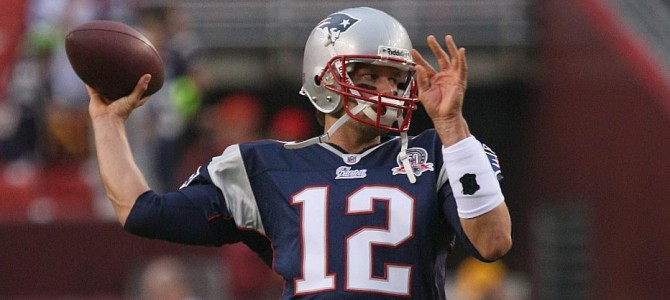
I don’t normally write about sports, but, as a dad, I’m very bothered by deflategate. I understand why Mark Brunell got choked up. I did, too.
Instead of looking forward to celebrating our togetherness around the shared experience of sports, I’m thinking about how to explain the media frenzy to my kids. When I was four my dad introduced me to Roger Staubach. Now, it’s pounds-per-square-inch and possible cover-ups.
Disclaimer: I used to work for Steve Largent when he was in politics. I’m a big Steve Largent fan—he’s a man of character and integrity. That said, I’m not a huge Seahawks fan and I’ve never been especially anti-New England. In fact, I was sad to see to the Pats’ perfect season ended by the Giants in the Super Bowl in 2008. If I’m biased it’s based more on my interactions with professional athletes who are honorable people.
What Belichick and Brady Should Have Said
I also come to this with a fair amount of experience setting up press conferences. In my judgment, the press conferences both Bill Belichick and Tom Brady held were unmitigated disasters. Giving each the benefit of the doubt, here’s what each should have said, but didn’t.
Belichick: “I didn’t have any knowledge of this situation. But what I did or didn’t know doesn’t matter. Any explanation or excuse doesn’t matter. It doesn’t matter because I should have known and didn’t. We were in violation of league rules. It’s that simple. There is no excuse. As the leader of this organization, I take full responsibility for what happened. Period.”
“As the leader, I want to apologize to my players, my owner, the Seattle Seahawks, the NFL, its fans, parents, coaches, and especially our nation’s youth. We all understand that football is just a game, but it isn’t just a game. Coaches and parents in any sport aren’t training their kids to be athletes, they’re teaching them to be adults—to have fun but also to learn character habits like hard work, perseverance, and fair play.”
“Obviously, we want to win football games, and my job is to win games. But I also understand that when those of us in positions of influence, privilege and authority create even the appearance that the rules don’t apply to us we’re damaging the integrity of the sport we love.”
“It saddens me beyond words that our organization would undermine—even unintentionally—the values coaches and parents are trying to instill in young people across the country. For that, I am deeply sorry.”
Brady: “Earlier today Coach Belichick stood before you and took responsibility for this episode. The fact that he would do that says a lot about his character and why he’s so highly respected by not just our players, but the entire league. But he wasn’t responsible. I was responsible. While I never directed our equipment manager to knowingly violate league rules I recognize that, by virtue of my position, I placed undue pressure on our personnel to provide me with I think are the ‘perfect’ footballs. Obviously, those footballs did not meet league specifications. That is inexcusable. But, again, I alone—not Coach Belichick or any of our staff—am responsible for this episode. I’m prepared to accept whatever consequences the league finds appropriate.”
Cheating Is Serious, Tom Brady
Sadly, that kind of tone was not on display during the press conferences. Brady was particularly dismissive. You don’t start a press conference with Q&A if you’re taking it seriously. Starting with Q&A says, “You people are silly and I want to get this over with but I’ll do my best to sprinkle in canned talking points prepared by staff.”
In a press conference, you deliver your message first. And you don’t ramble and hand a script to Saturday Night Live. Brady’s careless “ball” phraseology was funny but his comment that this “isn’t ISIS” wasn’t. Obviously, a sports controversy isn’t a foreign policy crisis. But that wasn’t Brady’s point. Brady was callously—and carelessly—using the atrocities perpetrated by ISIS to appear less guilty by contrast. His was the tone of an adolescent child spurning correction with a, “Gosh dad, this isn’t terrorism” attitude. When you deflate our national character, it is about ISIS. You can’t confront big problems when you dismiss little problems.
If either man would have taken responsibility (the fact that they were in violation of league rules isn’t in dispute) or simply said “sorry” this episode would have been put to rest. Instead, the Super Bowl has been tainted. If the Patriots win, the story will be the cheaters won. If the Seahawks win, the story will be the cheaters lost because they were distracted.
I guess the lesson for my kids will be something like this: Even though adults say “cheaters never win and winners never cheat” things aren’t always that simple in the real world. Sometimes the cheaters don’t get caught and don’t take responsibility. But, sooner or later, they—or we—always pay a price.
In sports and life, the worst performance-enhancing drug of all is hubris.









